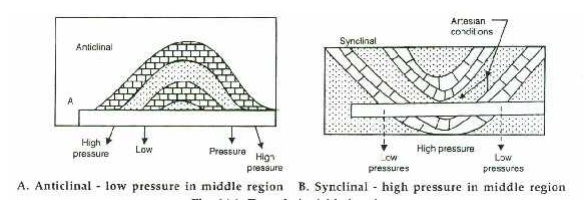Chapter: Civil : Engineering Geology : Application Of Geological Investigations
Application Of Geological Investigations: Folding

Folding
Folds signify bends and curvatures and a lot of strain energy
stored in the rocks. Their influence on design and construction of tunnels is
important from at least three angles:
Firstly, folding of rocks introduces considerable variation
and uncertainty in a sequence of rocks so that entirely unexpected rocks might
be encountered along any given direction.
This situation becomes especially serious when folding is not
recognized properly in preliminary or detailed surveys due either to its being
localized or to misinterpretation.
Secondly,
folding of rocks introduces peculiar rock pressures.
In anticlinal fold, loads of rocks at the crest are
transferred by arch action to a great extent on to the limbs which may be
highly strained
These conditions are reversed when the folds are of synclinal
types. In such cases, rocks of core regions are greatly strained.
Again, the axial regions of folds, anticlinal or synclinal,
having suffered the maximum bending are more often heavily fractured.
The alignment of a tunnel passing through a folded region has
to take these aspects in full consideration.
When excavations are made in folded rocks, the strain energy
is likely to be released immediately, soon after or quite late to tunnelling
operations, very often causing the dreaded rock bursts.
Thirdly, folded rocks are often best storehouses for artesian
water and also ideal as aquifers.
When encountered during tunnelling unexpectedly, these could
create uncontrollable situations.
The shattered axial regions being full of secondary joint
systems are highly permeable.
As such very effective drainage measure are often required to
be in readiness when excavations are to pass through folded zones.
Related Topics